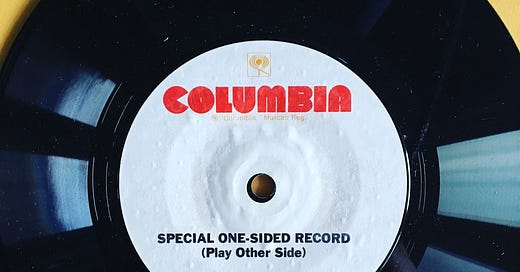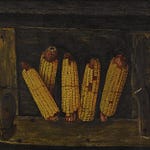Editor’s Note: This post originally appeared on , a culture magazine I write with . You can subscribe for free to get our weekly essays and conversations on culture.
I’m running it here in light of the massive cuts to journalism and media we’ve been seeing. These cuts hit close to home last week when the management at WAMU/DCist (where I used to work) abruptly and absurdly decided to shutter the DCist site and lay off fifteen people. It’s a bad decision. Follow the WAMU union for updates.
This piece was written before those cuts. It was inspired by a string of media cuts that saw critics and arts writers lose their jobs. Here it is:
On a recent episode of The New Yorker’s podcast Critics at Large, the hosts discussed why criticism matters. It’s the type of conversation that’s happening more often now, conducted between a dwindling number of professional critics. During a break, the show cut to an ad for another podcast, The Pitchfork Review. A few hours after the episode showed up online, Condé Nast, the parent company of both The New Yorker and Pitchfork announced it was folding Pitchfork into yet another Condé property, GQ. Critics would soon be out of work.
The positions cut at Pitchfork are among more than 500 journalism jobs eliminated in January alone. It’s impossible to separate the decline of professional criticism from the decline of journalism as a whole; publishers are collapsing and everything they make, from investigative reporting to weather forecasts to movie reviews, is vanishing. The executives making these cuts tend to cite “market forces,” which generally means a decline in advertising revenue. But these aren’t the only forces at play. In Platformer, Casey Newton wrote that Spotify undermined the role of critics:
Before Spotify, when presented with a new album, we would ask: why listen to this? After Spotify, we asked: why not?
As consumers of music, we came to Pitchfork to ask one question — is this worth listening to? — and got an entire education in return. But with the arrival of streaming music that question lost its meaning, and suddenly we had fewer and fewer reasons to seek out criticism.
This is true in the sense that criticism is first and foremost a recommendation, which it is to a lot of people. But that’s not all it is, and that’s not all it was, even to readers who only wanted to know whether they should buy a certain CD (as Newton writes, they came with a question “and got an entire education”). Just as there’s more to gain from reading criticism, there’s more to lose by avoiding it. The widespread abandonment of independent criticism for a streamer’s A.I. recommendations isn’t simply a societal move toward convenience, it’s a sign of a more concerning set of “market forces” away from contemplation and consideration and toward corporatism and artistic conservatism.
To put it perhaps too simply, critics pay attention to things (the hosts of Critics at Large expound on this very nicely in the episode linked above). Critics look at a work of art or culture, study it, and publish their reaction. They turn an idea into more ideas. The publishers, platforms, studios, and labels that put out things for us to read, watch, listen to, play, and otherwise engage with are becoming resistant to such dedicated thought. The endless scroll of short videos on social media and the streaming shows that play in the background are meant to be passively viewed. The audiences aren’t engaged enough to pay attention to them, let alone read an essay analyzing them. Thinking deeply about this entertainment is sure to lead to disappointment.
Elsewhere, some of the most popular, most actively engaged-with entertainment maintains its position out of brand loyalty. Martin Scorsese gave an opinion on superhero movies years ago and fans still won’t stop griping about it. These fans champion Marvel’s box office returns. They take the side of a giant corporation. They defend profits as proof either that a work has artistic merit, or as evidence that artistic merit doesn’t matter if something is popular. Other times, fans dismiss as inessential critiques that aren’t entirely in favor of a work, essentially arguing that the only worthy commentary is praise (critics who don’t offer praise are accused of ”yucking someone’s yum” in the upsetting parlance of the day). This defensiveness shows how thin our skin becomes when we avoid the space between extremes. Criticism of a work isn’t an attack on people who like it. Criticism isn’t meant to tell us our opinions are wrong. It tells us that other opinions exist, and it argues for their value. Criticism we disagree with is the whetstone we can sharpen our own ideas against. It’s also an invitation to spend time with an idea or a work of culture we might otherwise avoid.
Algorithms help us avoid culture, too. They’re framed as tools for discovery, but they’re built on the premise that if we like the taste of something, we must want it for every meal. In his new book, Kyle Chaka argues that this leads to a flattening of culture. It not only limits consumption, it limits creation, too, as artists try to copy whatever the algorithm is serving to audiences.
Algorithms, then, are a sort of anti-critic. They limit our exposure to culture. They champion the familiar over the new. They comfort instead of challenge. They encourage passive autoplay instead of active exploration. Ultimately, they serve the corporation that pays for the programming rather than the consumer. A machine that promises to do the thinking for us leads to a culture that discourages, independent deep thought. Algorithms are doing a job, but they’re not doing it for us.
Now we’re in a spiral. The demand for criticism fades and the need for it grows. When we view the decline in criticism as part of the decline of journalism as a whole, we see that the effects are similar. Just as city halls are going unwatched, crucial elements of our culture are going unexamined. For example: Who is making sense of YouTube, where stars like MrBeast command more viewers than pretty much any TV show? Who is parsing through TikTok for a deeper meaning beyond headlines about data privacy, wacky trends, or declining mental health? These works and platforms may resist criticism, but they still merit it.
Ultimately, less criticism means less conversation about art. And when we limit how we talk about art, we limit what art is made. When we limit what art is made, we limit what we as a culture are willing to confront in our society and in ourselves. We limit our ability to think. We rush toward sameness and comfort and we end up scared and small.
















Share this post